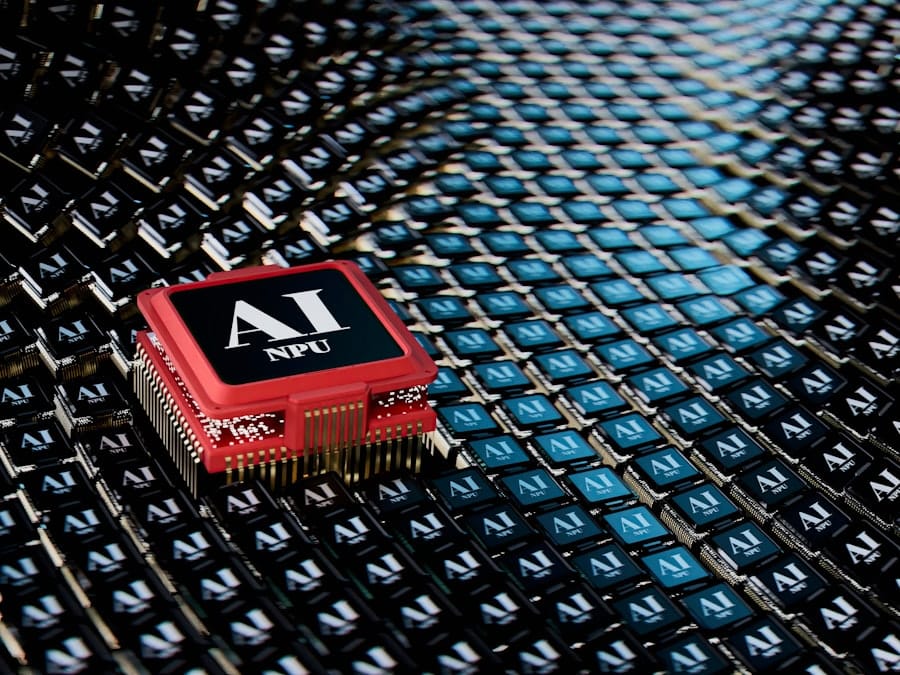Artificial Intelligence (AI) and Quantum Computing are two of the most transformative technologies of the 21st century, each with the potential to revolutionize various sectors. AI, characterized by its ability to learn from data, recognize patterns, and make decisions, has already made significant strides in fields such as healthcare, finance, and transportation. Quantum Computing, on the other hand, leverages the principles of quantum mechanics to process information in fundamentally different ways than classical computers.
By utilizing qubits, which can exist in multiple states simultaneously, quantum computers can perform complex calculations at speeds unattainable by traditional systems. The intersection of AI and Quantum Computing presents a unique opportunity for innovation. While AI excels in data analysis and pattern recognition, Quantum Computing offers unprecedented computational power that can enhance AI algorithms.
This collaboration could lead to breakthroughs in problem-solving capabilities, enabling more sophisticated models and applications. As researchers and technologists explore this synergy, the implications for industries and society at large are profound, promising advancements that could reshape our understanding of computation and intelligence.
Key Takeaways
- AI and quantum computing are two cutting-edge technologies that have the potential to revolutionize various industries.
- Collaboration between AI and quantum computing can lead to significant advancements in solving complex problems and optimizing processes.
- The collaboration of AI and quantum computing can be applied in areas such as drug discovery, financial modeling, and optimization of supply chains.
- Challenges in collaboration include the need for specialized expertise, high costs, and the complexity of integrating the two technologies.
- The future of AI and quantum computing collaboration holds promise for breakthroughs in machine learning, cryptography, and scientific research.
The Potential of AI and Quantum Computing Collaboration
The collaboration between AI and Quantum Computing holds immense potential for enhancing computational efficiency and problem-solving capabilities. One of the most significant advantages of this partnership is the ability to process vast amounts of data at unprecedented speeds. Quantum algorithms can tackle optimization problems that are currently infeasible for classical computers, such as those found in logistics, finance, and drug discovery.
For instance, a quantum computer could analyze numerous variables simultaneously to optimize supply chain logistics, leading to reduced costs and improved efficiency. Moreover, AI can benefit from quantum computing’s ability to handle complex datasets more effectively. Machine learning models often require extensive training on large datasets, which can be time-consuming and resource-intensive.
Quantum-enhanced machine learning algorithms could potentially reduce training times significantly by leveraging quantum parallelism. This means that tasks that would take classical computers weeks or even months could be completed in a fraction of the time, allowing for rapid iteration and refinement of AI models. The combination of these technologies could lead to more accurate predictions and insights across various domains.
Applications of AI and Quantum Computing Collaboration

The applications of AI and Quantum Computing collaboration are vast and varied, spanning multiple industries. In healthcare, for example, the integration of these technologies could lead to breakthroughs in personalized medicine. Quantum computing can analyze complex biological data at an unprecedented scale, while AI can interpret this data to identify patterns and correlations that may not be immediately apparent.
This synergy could enable the development of tailored treatment plans based on an individual’s genetic makeup and health history, ultimately improving patient outcomes. In finance, the collaboration between AI and Quantum Computing could revolutionize risk assessment and portfolio optimization. Financial institutions often rely on complex models to predict market trends and assess risks associated with investments.
Quantum algorithms can process vast datasets more efficiently than classical systems, allowing for real-time analysis of market conditions. Coupled with AI’s predictive capabilities, this could lead to more informed investment strategies and enhanced risk management practices. For instance, a quantum-enhanced AI model could analyze historical market data alongside real-time news feeds to predict stock price movements with greater accuracy.
Challenges and Limitations of AI and Quantum Computing Collaboration
Despite the promising potential of AI and Quantum Computing collaboration, several challenges and limitations must be addressed before widespread implementation can occur. One significant hurdle is the current state of quantum hardware. Quantum computers are still in their infancy, with many systems facing issues such as qubit coherence times and error rates that hinder their practical application.
As a result, developing robust quantum algorithms that can effectively integrate with AI systems remains a complex task. Additionally, there is a steep learning curve associated with both AI and Quantum Computing. Researchers and practitioners must possess a deep understanding of both fields to effectively harness their combined power.
This necessitates interdisciplinary collaboration among experts in computer science, physics, mathematics, and domain-specific knowledge areas. The scarcity of professionals with expertise in both AI and Quantum Computing poses a significant barrier to progress in this area.
Future Developments and Trends in AI and Quantum Computing Collaboration
Looking ahead, several trends are likely to shape the future of AI and Quantum Computing collaboration. One notable trend is the increasing investment in quantum research by both public and private sectors. Governments around the world are recognizing the strategic importance of quantum technology and are allocating substantial funding to research initiatives aimed at advancing quantum computing capabilities.
This influx of resources is expected to accelerate the development of more powerful quantum systems that can effectively support AI applications. Another trend is the emergence of hybrid models that combine classical computing with quantum processing. These hybrid approaches aim to leverage the strengths of both technologies while mitigating their respective limitations.
For instance, researchers are exploring ways to use classical computers for preprocessing data before passing it to quantum systems for more complex computations. This could streamline workflows and enhance overall efficiency in various applications.
Ethical and Societal Implications of AI and Quantum Computing Collaboration

As with any transformative technology, the collaboration between AI and Quantum Computing raises important ethical and societal implications that must be carefully considered. One major concern is the potential for increased inequality in access to these advanced technologies. As organizations invest heavily in quantum computing capabilities, there is a risk that only well-funded entities will benefit from these advancements, exacerbating existing disparities in technology access.
Moreover, the integration of AI into decision-making processes raises questions about accountability and transparency. As AI systems become more complex, understanding how they arrive at specific conclusions becomes increasingly challenging. When combined with quantum computing’s opaque nature—where outcomes may not be easily interpretable—this could lead to situations where decisions made by these systems lack accountability or fairness.
Ensuring that ethical guidelines are established and adhered to will be crucial as these technologies continue to evolve.
Industry and Research Initiatives in AI and Quantum Computing Collaboration
Numerous industry initiatives are currently underway to explore the collaboration between AI and Quantum Computing.
For instance, IBM’s Qiskit platform allows researchers to create quantum algorithms that can be integrated with machine learning models, facilitating experimentation at the intersection of these two fields.
In academia, research institutions are also playing a pivotal role in advancing this collaboration. Universities are establishing interdisciplinary programs that bring together experts from computer science, physics, mathematics, and engineering to explore innovative applications of AI in quantum contexts. Collaborative research projects often focus on developing new algorithms or exploring novel use cases that harness the unique strengths of both technologies.
The Impact of AI and Quantum Computing Collaboration
The collaboration between AI and Quantum Computing is poised to have a profound impact on various sectors, driving innovation and transforming how we approach complex problems. As these technologies continue to evolve, their combined potential will likely unlock new possibilities that were previously unimaginable. However, addressing the challenges associated with their integration will be essential for realizing this potential fully.
By fostering interdisciplinary collaboration among researchers and practitioners while considering ethical implications, society can harness the power of AI and Quantum Computing for the greater good. The future holds exciting prospects as we stand on the brink of a new era defined by these groundbreaking technologies.
In a related article, Stay Stylish with Wear OS by Google, explores how technology is influencing fashion and personal style. Just as AI and quantum computing are collaborating for speed in the tech world, wearable technology like smartwatches powered by Google’s Wear OS are revolutionizing the way we interact with our devices and stay connected on the go. This article delves into the latest trends in wearable tech and how they are shaping the future of fashion and technology.
FAQs
What is AI and Quantum Computing?
AI, or artificial intelligence, refers to the simulation of human intelligence processes by machines, especially computer systems. Quantum computing, on the other hand, is a type of computing that takes advantage of the strange ability of subatomic particles to exist in more than one state at any time.
How are AI and Quantum Computing collaborating for speed?
AI and quantum computing are collaborating to improve speed by leveraging the unique capabilities of quantum computing to process and analyze large amounts of data at a much faster rate than traditional computers. This allows AI algorithms to perform complex calculations and simulations more efficiently, leading to faster and more accurate results.
What are the potential benefits of the collaboration between AI and Quantum Computing?
The collaboration between AI and quantum computing has the potential to revolutionize various industries by enabling faster and more powerful data analysis, optimization, and machine learning. This could lead to advancements in fields such as drug discovery, financial modeling, and logistics, among others.
Are there any challenges in the collaboration between AI and Quantum Computing?
One of the main challenges in the collaboration between AI and quantum computing is the current limitations of quantum hardware, which are still in the early stages of development. Additionally, integrating AI algorithms with quantum computing systems requires specialized expertise and resources, making it a complex and costly endeavor.

